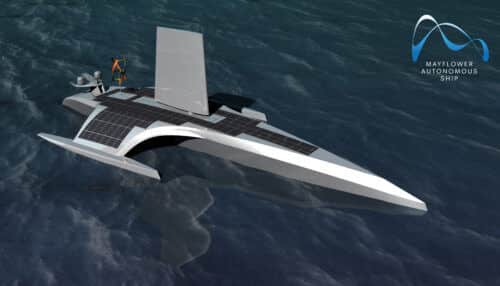IBM and Peru Mare's autonomous ship MAYFLOWER is expected to cross the Atlantic Ocean to collect environmental data

Marine research organization Pro-Mara and technology giant IBM announced the completion and launch of the Mayflower Autonomous Ship (MAS), an artificial intelligence and solar-powered research vessel that will cross oceans and collect vital environmental data.
After two years of planning, building and training all of its AI models, the new, fully autonomous Mayflower set sail today from Plymouth Beach in England, ahead of its official launch date.
The new generation of the "Mayflower", built to provide a safe, flexible and cost-effective way to collect data on the ocean, promises to bring about a revolution in the science of oceanography through collaboration with scientists and other autonomous vessels in order to understand critical issues such as global warming, the pollution of the oceans with microplastics, and the conservation of mammals marine The ProMare initiative coordinates scientific research in collaboration with IBM Research and the open source software Red Hat.
"The autonomous Mayflower ship is able to scan its environment in search of possible dangers, make decisions and change its course according to sensor data received in real time. Technologically, it is more like a modern bank than a 17th-century ship bearing the same name." said Andy Stanford-Clerk, Chief Technology Officer of IBM Great Britain and Ireland. "Her ability to continue operating even in the most challenging conditions makes this small ship the future of the 21st century."
In order to enable people from all over the world to keep up to date with the operations of the Mayflower Autonomous (MAS) as they are carried out, IBM and Pro-Mara today launched a new interactive portal at https://mas400.com. The portal was built by iX, the business planning arm of IBM Services and is powered by IBM Watson Assistant technology. The portal is designed to provide live updates on the ship's location, environmental conditions and data from its various research projects. Current weather data will also be fed from IBM's The Weather Company as MAS receives forecast data and insights from IBM's new Weather Center.
The ship's portal even includes a hidden passenger: it's a seven-armed octopus-like chatbot that claims it's just catching a ride on the ship. Arti, as the chat octopus is called, was developed in collaboration with the European startup Chatbotbay And he has mastered providing information about MAS and its exploits in a lively and friendly format.
"MAS400.com is one of the most advanced marine research portals ever built," says Frédéric Soreid, Scientific Director of the Autonomous Mayflower Ship Project and Pro-Mara Board Member. "The protection of the oceans depends on our ability to involve the public in important issues that affect our health. The MAS400 portal is designed to achieve this exact goal. He will tell his visitors about the ship, its sailing speed, weather conditions it passes through and the scientific research it carries out. Users will even be able to help Arti the Octopus fish out disposable surgical masks, cigarette butts and other waste of the most common types we find in the sea, from a virtual ocean of facts and data."
The next six months MAS will devote to experiments and research missions and various voyages and in the spring of 2021 it will try to cross the Atlantic Ocean. MAS's transatlantic voyage will take a similar route and with the same daring as the original 1620 Mayflower that crossed the ocean 400 years ago.
In the same topic on the science website:
